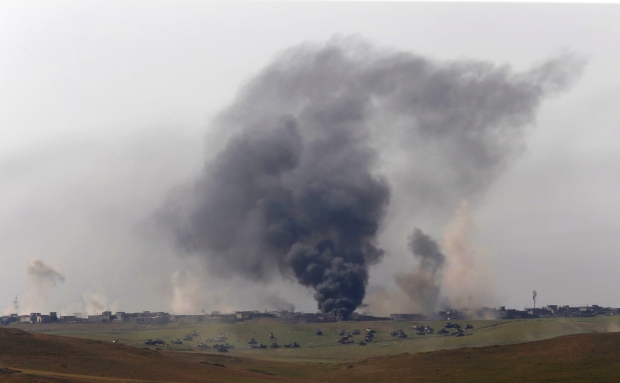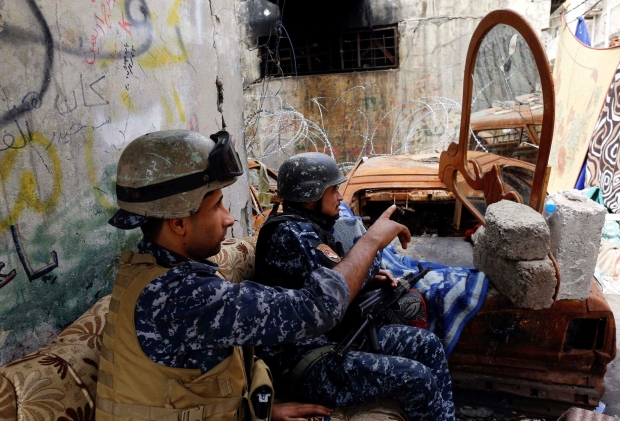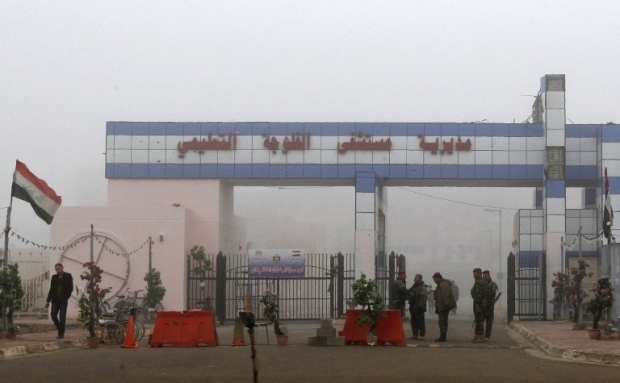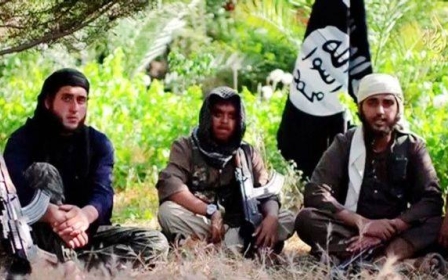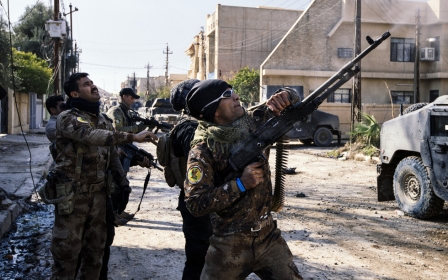In 'underground desert cities' Islamic State fighters lie in wait for Iraqi army
Having secured the towns and villages of Anbar province, and with commanders focused on the battle for the city of Mosul, Iraqi forces are now having to contend with a new Islamic State (IS) group tactic – desert ambushes.
Military sources say that beneath the sand, thousands of IS militants are hiding in underground tunnels and bunkers, from which they are launching a campaign to unnerve and disorientate the Iraqi army, already weary after years of fighting.
On Sunday, at least 10 Iraqi soldiers were killed and dozens more wounded when a group of IS combatants attacked a First Division army base near Rutba, in the Anbar desert.
The Iraqi forces went on high alert after the ambush, army sources told MEE.
But the following day, a similar attack took place near Saqar, also in Anbar, and also against a First Division base – at least 11 soldiers were killed, and five wounded, the military sources added.
These were the latest in a string of such recent attacks by IS, which have killed 26 Iraqi soldiers in the last month alone.
Sleeper cells
Military officials say the desert ambushes are being carried out by IS sleeper cells in the province, which has long played unwitting host to the group and its predecessors, even before IS took over large swathes of Iraq in 2014.
The recent attacks have targeted mostly non-combat troops, untrained and unequipped to engage in such fighting, officials said, and are aimed at draining the Iraqi army’s resources in the province.
Thousands of IS militants have withdrawn into the desert – stretching from the Iraqi-Syrian border in northwestern Anbar, the Jordanian border in the west, and the Saudi Arabian border in the southwest – since the Iraqi security forces, backed by the US-led military coalition and Popular Mobilisation Forces, succeeded in dislodging them from the cities and towns in Iraq’s west and north.
Anbar is Iraq’s largest province, encompassing a third of the country’s land. It is mostly desert, dotted with hills and caves and long, deep valleys, extending from the border with Syria to that with Jordan.
Iraqi security and local officials told MEE that dozens of temporary camps, serving as command and control headquarters for IS and equipped with the latest technologies, dot the desert landscape of Anbar and parts of Nineveh province, the north of which - near Mosul - is still under IS control.
'Daesh has built cities in the desert. Big cities with shops, tunnels and residential quarters'
- General Abdulkareem Khalaf, former spokesperson of Iraq’s Interior Ministry
"Daesh (the Arabic acronym for IS) has asked its fighters in Mosul and other areas to go back to the desert and work from there," Hikmat Suleiman, the Anbar governor’s spokesman, told MEE.
"The information indicates that there are four primary camps, in Ghadaq Valley, Husainiyat Valley and the desert of Rawa town, and these camps represent the most secure and fortified bases for IS commanders and fighters," Suleiman said.
"Dozens of smaller and temporary camps are attached to these main camps," Suleiman added.
Ant cities under the sand
All the military officers, security and local officials contacted by MEE confirmed that many IS combatants have retreated to the desert, to the dozens of temporary and permanent camps, some new and some that were established years ago.
Two sources said that the four main camps represent IS's biggest bases in the Middle East.
“Daesh has built cities in the desert. Big cities with shops, tunnels and residential quarters,” General Abdulkareem Khalaf, the former spokesman of Iraq’s Interior Ministry, told MEE.
“These underground cities are like ant cities,” he added.
IS, he said, are lashing out in these desert ambushes in an attempt to “force the Iraqi troops to move into specific areas.”
Several websites linked to IS have been circulating a video which purports to show the footage of the April 30 attack on the Fourth Battalion.
In the footage, a group of IS members are dressed in traditional Afghan clothes, driving SUVs covered in dirt, in an apparent effort to camouflage the vehicles.
Some hold machine guns, and others are mounted on the vehicles. The group attacks the headquarters of an Iraqi military unit, and the bodies of dead soldiers can be seen strewn around.
'We are confused and scared... we expect further attacks'
- Ahmed, Iraqi soldier stationed in Anbar
On Monday, Iraqi authorities in western Anbar ordered that soldiers’ regular leave be suspended until further notice, soldiers and border policemen in the area told MEE by phone.
"We are confused and scared. We requested that all soldiers stationed within the camp help us defend the earthen berms around the camp, as we expect further attacks,” Ahmed, a soldier stationed in the area, said. He asked that his last name not be used.
"They (IS) have been taking advantage of the geography of the area, and with their machine guns and their very modern and fast vehicles," Ahmed said, "they are superior at us in armament and equipment, and they know the area perfectly.”
Chess match
In an effort to confuse and disorientate the Iraqi troops, IS keeps attacking soldiers stationed along the international highway linking Iraq with Syria and Jordan, and forcing commanders to send reinforcements, sources said.
"It's like a chess match. But instead of being on defensive and waiting for the security forces to take the next step, Daesh has been attacking our troops," a senior federal security official, speaking on condition of anonymity, told MEE.
"If they (IS combatants) keep attacking our troops, they will drain them and weaken their ability to go after them," the official said.
"And in time, IS will regain more space to move freely back and forth between Iraq and Syria, as the borders on both sides are totally under their control,” he added.
The Iraqi troops deployed in the desert were an easy target for IS over the last few years, but the attacks have recently intensified, since the visit of Jared Kushner, US President Donald Trump’s adviser and son-in-law to Iraq in early April, sources told MEE.
The re-opening of the Trebil border crossing between Iraq and Jordan - closed in 2014 after IS seized control of most of the cities and towns of Anbar - was one of the key issues discussed between the Iraqi prime minister Haider al-Abadi and Kushner in that visit, sources said.
And the Iraqi government has already awarded a US security company a contract for securing the international highway and rebuilding and running its facilities, local sources told MEE.
Supporting the resumption of trade over this border between Iraq and Jordan would draw an immense US and Iraqi security presence, sources said, something that IS does not want.
"The company will secure the road and five kilometres on each side,” General Abdulkareem Khalaf said. “And they will build a lot of gas stations, malls and supermarkets."
“In addition, these facilities will be supported by the installation of surveillance cameras and other protective equipment all along the border, and more than 5,000 people will be employed, which means an intensive security presence on the ground,” Khalaf added. “So blocking this project is also a goal,” behind IS’s recent attacks, he said.
'Leaving the desert for Daesh'
After almost two years of fighting, Iraqi security forces have managed to liberate all the key cities and towns in Anbar, their priority in the province. But border towns, including A'ana, Rawah, Kabiessa and Qaim are still under the control of IS.
Moving to the border is not a priority for the Iraqi authorities yet, as most troops have been involved in the fighting in the north to complete the liberation of the second-largest Iraqi city of Mosul.
'The Iraqi troops will focus on the cities and leave the desert for Daesh'
- Senior federal security official
More attacks targeting troops in western Anbar are expected, as IS fighters are looking to maintain their positions and resources, security and local officials said.
"Daesh has lost its ability to hold onto land, but they are still plotting to carry out terrorist attacks in the cities, specifically in Ramadi, Sijar, Saqlawiya and Fallujah,” the senior federal security official said.
IS now holds about seven percent of Iraqi territory, down from the 40 percent it held three years ago, the Iraqi military announced in April.
"They are seeking to confuse our troops with these attacks, so they can infiltrate cities and areas of Anbar and carry out operations there," the official said.
"The Iraqi troops will focus on the cities and leave the desert for Daesh.”
New MEE newsletter: Jerusalem Dispatch
Sign up to get the latest insights and analysis on Israel-Palestine, alongside Turkey Unpacked and other MEE newsletters
Middle East Eye delivers independent and unrivalled coverage and analysis of the Middle East, North Africa and beyond. To learn more about republishing this content and the associated fees, please fill out this form. More about MEE can be found here.


